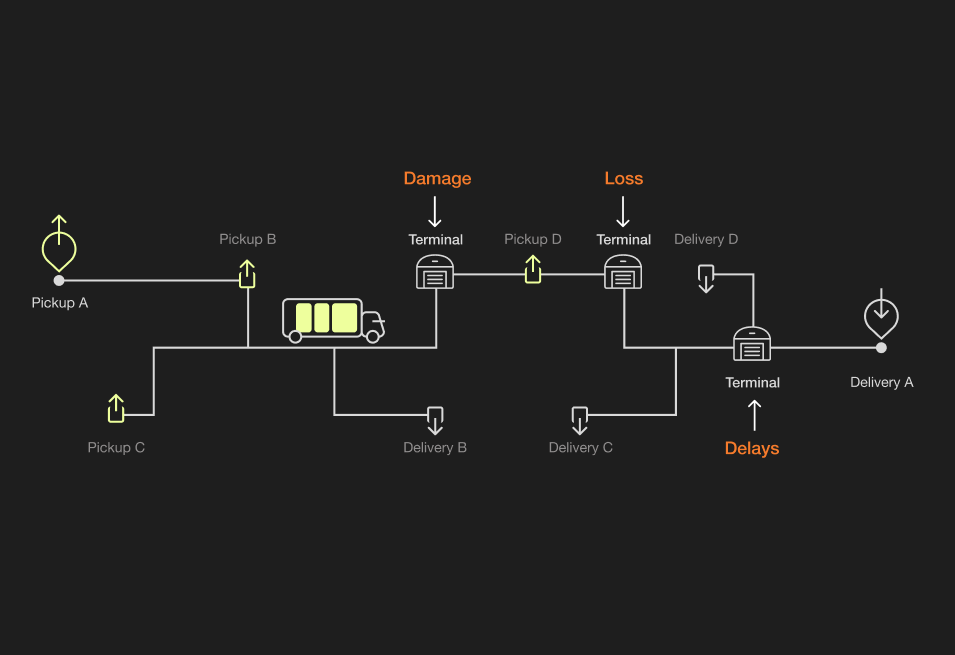Manifest 2023: Empowering Your Community & Supply Chain

This year at Manifest, Flock’s founder and CEO, Oren Zaslansky, joined Redwood Logistics and US Foods leaders for a sustainability panel, The S in ESG – Empowering Your Communities & Your Supply Chain. During that panel, he discussed how Flock prioritizes ESG as part of its core business practice.In case you missed it, or want a refresh, we’ve compiled the highlights of Oren’s insights such as what the ‘S’ stands for in ESG and why it matters, inefficiencies in the current supply chain, and Flock’s solution—including our culture and values as a B Corp.
[embed]https://youtu.be/CvlYItC-sRw[/embed]
Why the ‘S’ in ESG matters
ESG is a set of practices used to measure a company’s performance relating to social and environmental impact. Specifically, ESG stands for environmental, social, and governance. “I’m a strong believer that in order for an organization to realize their ESG goals, an organization must have diversity of thought, backgrounds, and life experiences,” said Oren. “This diversity feeds into the S of ESG and creates a flywheel effect of doing well by doing good.”While the E of ESG focuses on sustainability, the S encompasses diversity, equity, inclusion, and “doing good around the world and in the communities we operate in.” “These concepts have to be, and are often, interwoven across ESG,” he said. “It's appropriate that those three letters are bundled together because to disaggregate or unwind them can actually become problematic.”
Inefficiencies of today’s supply chain
Despite some easing of backlogs at the nation's ports and retailers reporting they were flush with inventory last summer, supply chain woes–including the current diesel shortages–are expected to persist. At the same time, rising inflation and decreased consumer demand for goods due to economic challenges mean higher fuel costs, increased labor costs, and higher prices for maintenance. Among the plethora of inefficiencies causing these challenges to persist, one in particular stood out to Oren: most of the trucks on the road are still traveling with empty space.And this waste of trailer space is evidence of further inefficiencies such as freight size restrictions and unnecessary handling, which lead to increased costs and late deliveries.For Oren, there was a clear solution: Fill up every truck on the highway.
Flock Freight’s solution to supply chain disruptions
By gaining B Corp certification, building a company culture focused on shared values, and pooling freight through shared truckload, Oren shared how Flock is working to solve some of the supply chain’s painful inefficiencies.
Embed sustainability into your business
B Corp Certification is given to for-profit companies by B Lab, a non-profit international network, and is a measure of a company’s social and environmental performance. The key to B Corp is in the qualification process, it's largely two main criteria: sustainability and diversity.“The way we use B Corp at Flock is to drive these flywheels and virtuous cycles across the ESG, where in order to qualify, you're empirically scored,” said Oren. “We had to prove that we could carbon neutralize and reduce carbon by taking a half-empty truck and filling it up. It's pretty obvious, right? You're gonna burn a certain amount of diesel if the truck's half empty or full.”Sustainability needs to both be both profitable and frictionless. We need to make it easy for companies to make a great choice and partner with a more sustainable outcome. The same is true with diversity and inclusion. We are creating a framework that is measurable. We’re held accountable to this framework and have to requalify every other year. This keeps us honest and helps us drive in more talent. When you bring in talent who are passionate about those outcomes, they make a set of choices to perpetuate, if not further, those outcomes, which then puts us in a position to do more recruiting. You create that virtuous cycle.Oren shared three tips for B Corps or those looking to be certified:1. Ask yourself an uncomfortable question: Are we doing this to be compliant or because we see the value in diversity? “Doing it just to be compliant is not terrible, but it’s better to recognize that by having a diverse set of experiences and perspectives at the table you’re able to make better decisions, make the team better, make the company better, and create more shareholder value.”2. Own your objectives. “Be really conscious and thoughtful about what you’re trying to accomplish–there’s nothing worse than breeding a false goal.” 3. Build an environment where you gather a diverse and healthy mix of candidates. “This enables you to go ahead and hire the best person for the job and if you do it right, you end up with someone who brings an entirely different point of view and set of life experiences to the table.”
Build a company culture focused on shared values
Alongside diversity and social responsibility, these are the values on which Flock in built:
- All-In
- Empower others
- Be agile
- Think big
- Do the right thing
And we wear these values on our sleeves.“One of the things we've done really well over the years is we've had a point of view and we constantly beat a drum to it internally with our team.”Here are some keys to cultivating a company of shared values:
- Get your entire team engaged in the S of ESG. “It’s about creating these virtuous cycles–flywheels–where one good choice leads to more choices that are getting better and better.”
- Drive a culture that will chew glass. “Your team should be willing to chew glass and grind, while also continuing to innovate and take chances.”
- Wear your values on your sleeve. “You don’t quietly whisper your values, you scream them, and most importantly, you live them.”
Following these keys will build another virtuous cycle of tightly ingrained team members who really believe. “You’ll be flowing in a river of mission, purpose, values, hard work, success, and failure,” he said. “It all gets entangled in this really beautiful way where you’re creating this culture and value that says, we know who we are. In tough times, having that kind of strong, resilient culture is more important than ever.” “I'm a huge believer in the idea that doing small things matters and doing small things compounds,” said Oren. “There are things we do at Flock, like pulling freight, that are measurable at scale that will drive big outcomes.”
Pool freight to better the planet (and your bottom line)
Why do trucks burn tons of diesel just to run half-empty? Because companies face significant pressure to ship goods on-time and damage-free—regardless of whether they can fill a truck to its intended capacity. As a result, in most cases, those companies are paying to ship air.If every truck carried all the inventory it’s designed to hold, we could drive down total emissions from diesel trucking by 40%. Once Oren realized this, he directed his attention toward building a smarter alternative to traditional freight shipping–one that uses algorithmic technology to find and fill the empty space in trucks. The result is Flock’s solution to pool freight at scale, using data that says “I'm here today and want to be there tomorrow.” This data creates a more optimal outcome for carriers and shippers. By leaning into that data, Oren explained, we can create an entirely new supply chain that's much less intensive across capital, infrastructure, and carbon standpoints.Though the underlying technology is complex, the shared truckload concept is simple: Keep trucks full by combining freight from multiple shippers whose goods are heading in the same direction with carriers who are already driving that way.“The most important takeaway about pooling freight is that it’s a financial win-win for both shippers and carriers,” he said. “We know that shared truckload is inherently better for the environment, but it works because it offers immediate incentives for everyone involved.”Last year Flock moved over 751 million pounds of freight carbon neutral and saved over 31 thousand metric tons of CO2e (about the same carbon output of 11,000 gasoline-powered vehicles in one year).
Putting words into action
Like Oren said, it’s important to do small things that matter. Cultivating a values-driven culture and focusing on the ‘social’ in ESG will help you build a thriving company that is sustainable, diverse, and united.If we want to foster a habitable planet, business leaders have no choice but to open their eyes.Join us in reinventing the freight industry by relentlessly eliminating waste and inefficiency through shared truckloads.





